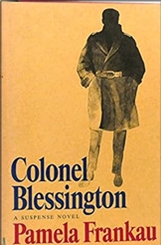Sun 5 Nov 2023
Reviewed by David Vineyard: PAMELA FRANKAU – Colonel Blessington.
Posted by Steve under Reviews[5] Comments
PAMELA FRANKAU – Colonel Blessington. [Completed by Diana Raymond.] Bodley Head, UK, hardcover, 1968. Delacorte, US, hardcover, 1969. Dell 1378, US, paperback, 1970.

And well he might. Harvey Blessington is many things to many people. To most he is a war hero, the brave Colonel Blessington, to Anthony Price he is the man who ought to replace the candidate for Parliment they both support, to actress Anita Gilroy he is object of her first love, and to her father Matthew, he is his ex-commando comrade in arms and the object of an obsessive memory a nightmare running “like a dark river underground, until he also becomes the object of fear and a mystery that remains unsolved.”
Like quicksilver Harvey Blessington seems always changing shape, sometimes a shadow, sometimes bright as the sun, sometimes dark and strangely threatening. At the heart of Harvey Blessington is a mystery, one just beyond belief, at once revealing and impossible to believe.
One worth men’s lives to keep hidden.
Colonel Blessington was the final novel by British novelist Pamela Frankau, and her first suspense novel venturing into the kind of duality and uncertainty of a Graham Greene or Patrica Highsmith. Frankau grew ill and died while writing the book and her friend novelist Diana Raymond finished the book from her extensive notebooks. While the novel was recognized in its time and critically praised in both Britain and here, her death perhaps overshadowed the novel which isn’t half as well known as it once was.

Frankau was the daughter of British literary gadabout Gilbert Frankau, who abandoned her and her mother when she was small. She went on to become a famed and critically praised novelist on her own, her some sixteen novels such as A Wreath for the Enemy, Over the Mountain, and Clothes of a King’s Son, among her better known works.
As Matthew Gilroy finds himself hunted and hunter going to ground to uncover the enigma of Blessington, the tension ratchets up and the need to solve the mystery of Harvey Blessington a matter of life and death.
Why?
You were the man who killed beside me in the war, all those years ago, But — to kill me for that? You were so sure you would kill me you boasted of another murder; of a girl that haunted you… Why?
Blessington is something of a tour-de-force, pulling off a twist worthy of Agatha Christie. It’s one of those books that cleverly lays the groundwork for its key revelation so you can look back and see each clue and misdirection, yet has a solution so shocking that you won’t guess it ahead of time, Blessington’s ultimate flaw “…to take people’s lives and spoil them — a love of power. A common love brought to extremes —â€
I first read Colonel Blessington when it came out back in 1968. It still holds up today, its final revelation still as stunning and chilling as it was then, its quiet shocks coming with a chill to the bone and a recognition of our own prejudices and blindness when we fail to see the obvious right in front of us and recognize the duplicitous Blessingtons in our own lives.
November 6th, 2023 at 4:11 am
And once more a great review adds yet another book to my want list.
Thanks, David!
November 6th, 2023 at 1:09 pm
Ditto that, David. Any review that includes the phrase “Blessington is something of a tour-de-force, pulling off a twist worthy of Agatha Christie” is a must have for me.
November 7th, 2023 at 7:55 pm
Frankau is a fine writer, in my opinion surpassing her dead beat Dad Gilbert who was something of a celebrity in his time, and other works have flirted with the suspense novel, but this one is her most direct entry in the form, and unless I gave it away, I think the twist will come as a genuine surprise.
Gilbert was the creator of cigar store owner Marcus Orlando who appeared in at least one collection of stories subtitled a Romance of the Secret Service though most of the stories seem associational only if I recall them correctly,
He was popular enough his books weren’t particularly hard to find back in the day, some more so than others, but today is best remembered for being Pamela’s father.
Pamela was better known in the UK, but many of her books were printed here and pop up in library collections.
I think the American paperback was from Dell, I vaguely recall an attractive woman (photo) on the cover with a man in a trenchcoat in the background.
The bonus is it is a relatively short novel, well within the range of most mystery and suspense novels of the period and pulls off a good twist. It is not a wholly original one, but the smoothness and solid psychology behind it elevate it above the possible exploitive possibilities.
November 7th, 2023 at 9:30 pm
David
I looked earlier but I couldn’t find a paperback edition of the book, so thanks for pointing me in the right direction. Here’s a cover image of it, along with a link to the website where I found it:
https://www.illustrationhistory.org/essays/victor-livoti-illustrations-best-kept-secret
… and scroll down.
December 2nd, 2023 at 9:32 am
Just a quick Thank You for recommending this, David. I enjoyed it immensely and enormously.